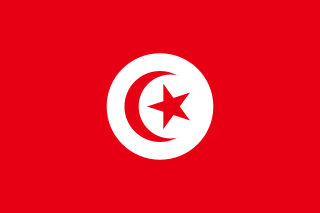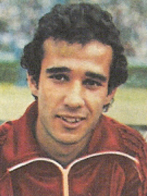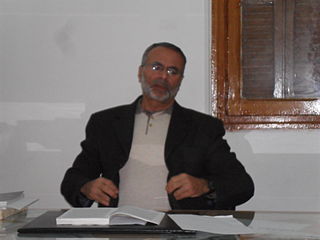
Abderraouf El Basti is a Tunisian politician. He is the former Minister of Culture and Protection of National Heritage. [1]

Abderraouf El Basti is a Tunisian politician. He is the former Minister of Culture and Protection of National Heritage. [1]
Abderraouf El Basti was born on August 19, 1947. [2] He received a master's degree in Arabic literature from the University of Tunis. [2]
From 1981 to 1988, he worked for the Union des Radios Arabes, and he was its CEO from 1989 to 1998. [2] From 1999 to 2000, he was the Tunisian Ambassador to Lebanon. [2] From 2000 to 2002, he was the President of the Établissement de la Radiodiffusion-Télévision Tunisienne. [2] He was then Ambassador to Jordan. [2] In 2007, he was appointed as Secretary of State to the Foreign Ministry. In 2008, he became the Minister of Culture and Protection of National Heritage. [2]

Zine El Abidine Ben Ali, commonly known as Ben Ali or Ezzine, was a Tunisian politician who served as the second president of Tunisia from 1987 to 2011. In that year, during the Tunisian revolution, he was overthrown and fled to Saudi Arabia.

Tunisian culture is a product of more than three thousand years of history and an important multi-ethnic influx. Ancient Tunisia was a major civilization crossing through history; different cultures, civilizations and multiple successive dynasties contributed to the culture of the country over centuries with varying degrees of influence. Among these cultures were the Carthaginian – their native civilization, Roman, Vandal, Jewish, Christian, Arab, Islamic, Turkish, and French, in addition to native Amazigh. This unique mixture of cultures made Tunisia, with its strategic geographical location in the Mediterranean, the core of several civilizations of Mare Nostrum.

During the 1976 Summer Olympics held in Montréal in Canada, the Tunisian team initially competed but then joined a boycott by all but two African nations. The boycott was called due to the International Olympic Committee (IOC) allowing the New Zealand team to participate despite the recent tour of South Africa by the country's rugby union team. Sporting contact with South Africans was banned by the IOC as a consequence of the system of apartheid operated in the country.

Abbas El Fassi is a Moroccan politician and businessman who served as the 14th Prime Minister of Morocco from 19 September 2007 to 29 November 2011. El Fassi, a member of the Istiqlal Party, replaced independent Driss Jettou.
Basti may refer to:

Russia–Tunisia relations are foreign relations between Russia and Tunisia. Both countries had established diplomatic relations in 1956, when Tunisia got its independence. Russia has an embassy in Tunis, and Tunisia has an embassy in Moscow.

Israel–Tunisia relations refers to bilateral relations between Israel and Tunisia. There are no official diplomatic relations between the two states. While Tunisia is Sunni moderate Western-allied state with a long history of a Jewish community, it is dependent on relations with Algeria and has a president hostile to Israel.

Fouad Mebazaa is a Tunisian politician who was the acting president of Tunisia from 15 January 2011 to 13 December 2011. He was active in Neo Destour prior to Tunisian independence, served as Minister of Youth and Sports, Minister of Public Health, and Minister of Culture and Information, and was Speaker of the Chamber of Deputies of Tunisia from 1991 to 2011.
The Congress for the Republic, also referred to as El Mottamar or by its French acronym CPR, is a centre-left secular political party in Tunisia. It was created in 2001, but legalised only after the 2011 Tunisian revolution. Its most prominent founder and long-term leader was Moncef Marzouki. He had been the party's honorary president since he became interim President of Tunisia in December 2011.
Abderrahim Zouari is a Tunisian politician. He was the Minister of Transport from 2004 to 2011 under President Zine El Abidine Ben Ali. He was the candidate for the Destourian Movement in the 2014 presidential election. In January 2019, Zouari formed a party named Tahya Tounes.

Abderraouf Ben Aziza is a Tunisian football forward who played for the Tunisia national team. He appeared for Tunisia in the 1978 FIFA World Cup. He also played for Étoile Sportive du Sahel. He also played for Al-Nassr for 3 years from 1978 until 1981 and won the Saudi League twice, in 1980 and 1981.

Abderraouf Ayadi is a Tunisian human rights activist, politician and lawyer.

Sonia M'barek is a Tunisian singer of classical Arabic music and related genres. She was Minister of Culture from January to August 2016.

The Wafa Movement, sometimes referred to as the Independent Democratic Congress, is a political party in Tunisia.

Mokhtar Yahyaoui was a human rights activist and a Tunisian judge. He was opposed to the system of former Tunisian President Zine El Abidine Ben Ali. Yahyaoui was born on June 1, 1952, in the village of Ksar Hadada in southern Tunisia, and died on September 22, 2015, in Teskrayah in the village of Ghazaleh from the region of Bizerte.

Mohamed Abbou, born on 10 May 1966 in Tunis, is a Tunisian lawyer and politician.
Mohamed El Aziz Ben Achour is a Tunisian politician and historian born on 5 January 1951; he specializes in urban, social and cultural history of modern Tunisia and the Islamic civilization. He was the Minister of Culture some time between 2004 and 2008, and later Director-General of the Arab League Educational, Cultural and Scientific Organization (ALECSO) some time between 2009 and 2013.
Basti is both a given name and a surname. Notable people with the name include:
Abderraouf Othmani is an Algerian footballer who plays for CA Bizertin in the Tunisian Ligue Professionnelle 1, on loan from USM Alger.
Events in the year 2023 in Morocco.